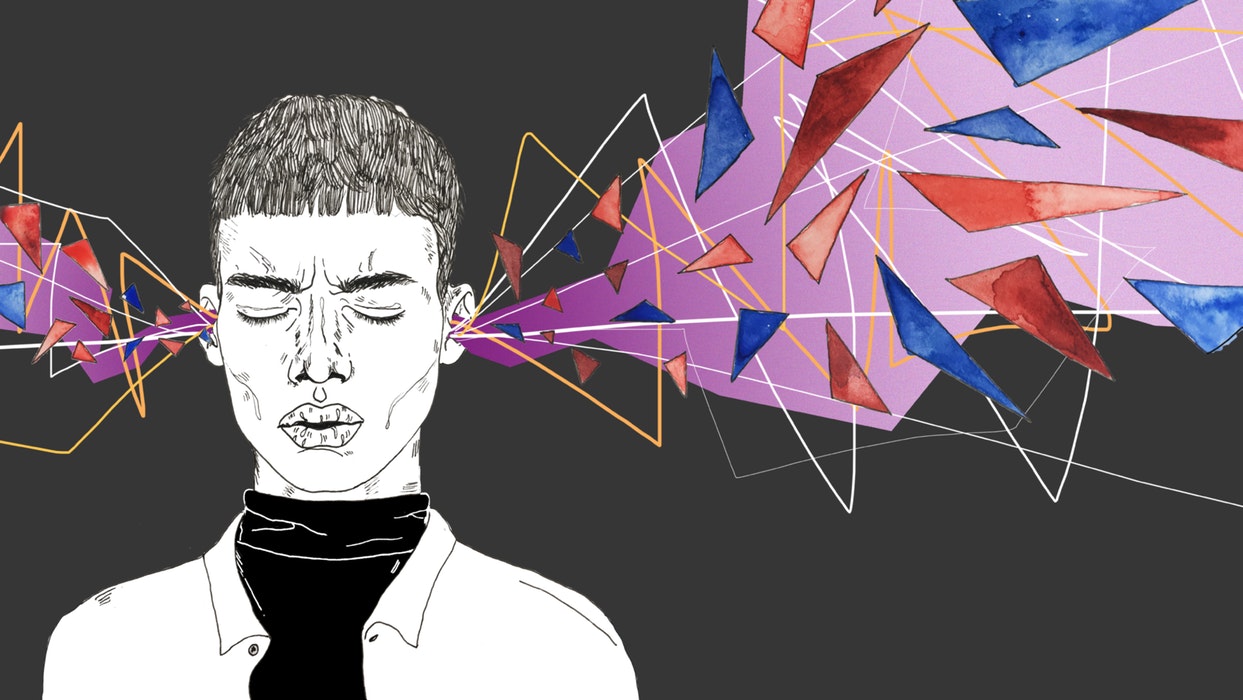|
BY MARYBETH GRONEK I've always been mesmerized by documentaries of people who experienced a taste of the afterlife. You know the story: the person died very briefly, saw bright lights, experienced warm & loving sensations, and then was pulled back to earth to proudly tell their tale. To be honest, I’m not sure if I believe all of those stories, but to say I’m captivated by them would be a massive piece of understatement. There’s something inspiring and transcendent about coming back from a point of no return and then instructing others as an imperative. I had a similar point of no return in my own life. I don’t claim to have seen heaven, but I sure have seen hell. And it was a hell of my own making. I was 26 — broke, lonely, and just not where I wanted to be. I had “friends” who didn’t actually care about me, a job that didn’t value me, a threadbare bank account, and no prospects in my love life. I didn’t know how to stick up for myself. I didn’t know how to communicate my value in a productive manner. I didn’t know how to create wealth. I didn’t know how to date. In essence, I was glum about where I was in life and felt stuck in that I didn’t know how to move forward. It was at this low point that I realized it was my own thinking that was holding me back. Actually, that’s too generous of a statement. It was my own thinking that was ruining my life. And from that point forward I had a long journey of conquering myself to slowly extirpate that toxic and self-destructive way of thinking. Along the journey, I had an epiphany. I realized there were four things that were ruining my life. This unholy tetrad wreaks havoc wherever it is found. I share it in hopes that you too can spot it, remove it, and step into the life of abundance you were called to live. 1. Fear That eerie spectre that looms large, stealing your joy and contentment under a cloud of ‘what if?’ Fear of not having enough money. Fear of speaking your mind. Fear of taking a new job and it not working out. Fear of committing to one partner. Fear of sticking your neck out and failing. Fear pertains to your future. Its focus is forward, it’s hues are extreme, it’s light is always negative, and its landscape is context-less. Fear will ruin your life because it immobilizes you — keeping you from taking necessary action to advance in life. 2. Pain #1 and #2 are related. Fear is often a manifestation of unresolved pain. It’s being scared to do do what is right & necessary as a result of being burned in the past. The man whose heart was broken and uses pain as a reason to never be vulnerable again. The abused child who grows up and builds walls around her heart. The walls that keep out pain but also keep out love. Pain pertains to your past. Its gaze is backward, its palate is grim, its characters are grizzly and one-dimensional, and its decision-making is irrational. Pain will ruin your life because it allows you to make decisions contrary to your own interests. In trying to protect yourself, you end up limiting yourself. Pain still rules over you, the dominion-less master that continues to steal from you because you let him. Pain is your old landlord — except you’ve bought a home now and he has no business showing up and demanding things of you. But you still listen. And you keep giving. 3. Excuses Abundance is one step away from taking responsibility for your actions. An excuse: seemingly innocent, yet completely destructive. It’s the reason why you’ve been passed up for a promotion, again. It’s the reason why your kids won’t talk to you. It’s the reason why your ex broke up with you. Excuses pertain to your present. When confronted with your own shortcomings, your knee-jerk reaction is to defend: here is why I did that. Observe my beautiful reasons and you’ll understand. I don’t know why we do this. Excuses make us look weaker, not stronger. They kill our impact and gut any sort of respect people had of us hitherto. When confronted with your failings — whether big or small — there is only *one* response that is suitable: You know what. You’re right. I missed the mark, & I see how that negatively impacted you. I will do better going forward. 4. Guilt Some people use “guilt” as a soft synonym for “pain,” but that isn’t quite right. Pain relates to your past, and often, to things done to you. Guilt pertains to your choices and is a direct response of things done by you. Maybe you made a poor decision that had a terrible ripple effect. Maybe you had a drink when you told yourself you wouldn’t. Maybe you weren’t present and engaged while your kids were growing up, and they’ve made a mess of their life and you feel responsible. Guilt hovers between past, present, and future. It’s the ghost that knows no boxes and goes where it pleases. It’s also the ghost who is ravenous, and everlastingly until you lean into acceptance. This means extending grace for what you have done and accepting what has become. Making peace with all that was and is — it’s the only thing that starves guilt and makes a brighter future possible. Notice the common denominator in all four — you. You are the biggest obstacle in your way. You are Public Enemy #1 in your own story, both the protagonist and the antagonist. But it doesn’t have to be that way.
Don’t for a second buy into the lie that other people will ruin your life. That’s intellectually lazy and counterproductive. The more you make your own shortcomings about other people, the less you will succeed. That grievance you have against others? That blame-filled conga line of so-and-so is the reason I’m not happy, or successful, or don’t have the life I want? As Elsa would say, you’ve got to let it go. Others aren’t culpable for what you’ve done with your life. You need to have the funeral for that line of thinking. I say this not as someone from the outside looking in, but as someone on the receiving end of the very grievances you are citing. I’ve been through hell and back at the expense of other people. Yes, others’ actions may have impacted where I am today, but continuing to blame them doesn’t move the needle in my own life. Not one iota. Me owning my life and decisions moving forward does. What “happened” to you is just the prologue. You write all the forthcoming chapters. The chapters are rich with your adventure, your actions, your stumblings, your triumphs, and most importantly, your agency. You are the protagonist. Never forget that. And for goodness sake, stop living in the prologue. Can I let you in on a little secret? When I read a book, I usually skip the prologue. Most people don’t care (or care very little) about what got you here. They are more concerned with the person in front of them and what that person is going to do going forward. “Prologue you” matters very little. “Chapter you” matters much more. It’s where the story is lived. It’s where the character depth is woven and worked out. In short, it’s where the magic happens. Guard those chapters like a prized jewel. Be vigilant in your thinking. It’s your own fear, pain, excuses, and guilt that detract from everything that journey could be. Join my tenacity in ripping out those dangerous weeds along the journey’s path. We were made for more than smallness and self-sabotage. Any success, anything worth having in life, is preceded first by conquering oneself. I’m going to walk into today — and every day forthcoming — with the belief that I hold the keys to my own flourishing. I hope you’ll join me.
7 Comments
BY JENNY. B It has been one of the great honors of my life to have graduated as a Psychology major in 2006.
Truly. While I was earning my degree, the field of Psychology itself was undergoing what felt like a Renaissance, expanding beyond a narrow definition or association with mental illness and conditioned behaviors toward a holistic view of wellness and our shared humanity. I was a student at Harvard when the traditional course offerings multiplied and began to include Positive Psychology and new depths in the Psychology of Leadership and Teams and topics surrounding happiness and creativity. This was certainly the result of hard work and years of stewardship by leaders in Psychology and at the University. At the same time, it felt like an overnight sensation. There were packed auditoriums and an electric buzz around prestigious and up-and-coming visiting speakers and the venerated titans of Psychology on the Harvard faculty. While it would be an impossible task and a disservice to attempt to distill all that was learned and discussed in those years with those great mentors, I can share 3 key concepts I return to, time and again. I find these to be true whether leading a business, volunteer group, or my household:
BY MARYBETH GRONEK Do you have auto-reflex cringe moments? I do. One of them is when people are heavy-handed with self-proclamations:
Here’s why self-proclamations make me cringe: they are usually inauthentic. People who *are* a certain way don’t talk about it. They just are it. For example, people who take dating seriously don’t tell me about it, they live it. They communicate regularly and pursue me. They send meaningful and well-crafted text messages. They call. They show up. They put in the effort. Their actions — not their words — inform my opinion of them. Adjectives are best used to describe others. When people use adjectives to describe themselves I get skeptical. Integrated, self-aware individuals manifest who they are without the need to tell people how to view them. They just show up that way and leave others to draw their own conclusions. They show, not tell. As soon as someone tells me they are “direct” or “kind” or [insert your own adjective here] I know there is a gap there. It is a line spoken to convince themselves (more than me) that they are indeed that way. Lies are loud. They have to be. They know they are wrong & their self-consciousness won’t let them stay quiet. They must perpetually assert themselves lest others discover their fallacious nature. The truth, on the other hand, sits quietly in the corner. It is not self-conscious. It knows what it is and does not need to convince self or others. The truth is secure. I don’t think people do this maliciously. Self-proclamations aren’t as bad as bold-face lies. They are low-impact, subconscious ones. Either the actions of someone who doesn’t see themselves clearly, or someone who has been making strides in a certain area but not quite where they want to be. A work in progress. It’s not so terrible. It is insecure, though. There’s another thing self-given adjectives reveal besides insecurity — a desire to shape the narrative. To control the way others see us. Whenever I catch myself using an adjective to describe myself to others I pause and ask, why did I just do that? 80% of the time it’s an insecurity and a red alert to hone in on that area and take actions to either grow in that space or lean into acceptance. 20% of the time, though, it’s me recognizing I want the other person to see me in a certain way, and our interactions thus far haven’t yet matured for them to see me in that light naturally. Hence, I’m trying to *speed up* a certain conclusion about me instead of letting it happen slowly and organically. When I first realized I was doing this, I was embarrassed. It uncovered a fear of mine: I wanted people to get to know the *real* me as soon as possible, lest they think I’m too vanilla and leave. I’m so cool and unique, don’t go! A fear of being misunderstood, and consequently, a fear of abandonment. In a weird way, it’s its own sort of insecurity. And then I heard a quiet voice: Slow down, MaryBeth. Give people time to get to know you. To discover others is a bloody gift. It’s one of the things I enjoy most about relationships. People are meant to be unraveled — beautifully and reverently unraveled. Give other people that gift. Embarrassment soon led to freedom. Because that’s the encouraging thing about fear — it can always be conquered. So now I show up how I want to show up and let others draw their own conclusions. It’s an odd, yet contented feeling. Sitting with the potential of being misunderstood by sojourners who pass in and out of my life. Expectant for those who stay and uncover who I am. Not everyone has to be “right” about me. Few will. Others’ premature or false conclusions of me don’t have to align with the reality of who I am. And I’m learning to be okay with that. BY DIANE KERTH Last week I heard this phrase when my friend Sally and I were out to lunch. We were catching up on life and how things have been since the last time we got together. The conversation started going down a dark road of stress, frustration, depression and then she said, “What can I do, it’s just the way it is. I don’t have a choice.” My eyes opened wide, she knew me well, I said, “You do have choices, you may not like the choices that are available, but you do have a choice.” Sally looked mildly annoyed and without saying any words gave me the Diane obviously doesn’t understand my situation kind of look. I didn’t let a moment pass before I said, “I know what you’re thinking, and you DO have choices and to take it one step further, you have power in those choices!” When we miss the awareness piece of asking ourselves what options do I have? what choices do I have? we are giving away our power.
Here’s an example. Every Sunday afternoon I go to my parent’s home (they’re 88 years old) and I help them with a honey-do list. I walk in the door each week and they hand me the list right away of the things they want done. I have been going there every Sunday now for 15 years. In the first year of Sunday honey-do lists, resentment started to build because they were taking my time and always expected me to do more and more. I became annoyed, irritated, and stressed every Saturday night that year thinking that tomorrow I would be “wasting” another Sunday not getting anything done at my own house or in my own life. (I know I sound horrible but that’s what I was thinking!) It created friction and issues when I went over there on Sundays. I found myself being cranky and snappy. It was so bad that one Sunday night when I got home I just broke down and cried. In my head I was saying why is this happening to me and why can’t I have my Sundays to myself like everybody else in my office? They get to relax and have fun and do things. I don’t have that. I am stuck helping my parents. UGH! Why am I having these horrible feelings? I’m a nice person, I respect my parents, how did it get to this point? Then something came over me and I snapped out of it, I woke up! Nothing was “happening to me” so to speak. I was the one with the problem, not my parents. The most frustrating thing for me about this realization is that I have been studying how choices are connected to personal power, and our sense of control, for years. How could I have not connected the dots for myself? This was what I spent years studying and working on. I was so blinded by feeling miserable and self-righteous that I didn’t take the time to look at what choices I had in this situation with my parents. We often have choices that go unacknowledged or unrecognized because we are so busy “feeling.” Feeling happy, sad, angry, frustrated, lost, annoyed or stressed. We have to wake up, stop ourselves and really look at our options and so…. I did just that. There may have been more than three options, but these were the ones I considered. Option #1- I can continue on and do nothing different. Option #2- I can stop going to my parents all together on Sundays, the end. (Not a great option, my parents needed me, and it would be totally selfish but… it was a real option) Option #3- I can adjust the way I look at the situation. (Which IS the choice I made.) What a wonderful choice! It was so empowering to take control of myself and realize I AM MAKING the choice to go to my parents every Sunday - no one is forcing me physically to go. I am CHOOSING to spend time with my parents and do their honey-do list. I am blessed that I have this time with them. When I took control of my choices and the direction I DECIDED to go. I felt strong and powerful. I have been filled with pride every Sunday I drive to my parent’s home because I know I am in charge of my decisions and this is my choice. We all go through ups and downs in life but when we pause and examine the choices available to us, we can then make conscious decisions on how to proceed. It puts us in the driver’s seat. I can say no, yes, or here’s a different option. Over the years I have often been asked how I stay so positive and happy through the challenging things I’ve experienced in my life. I share that once I had the realization of how powerful I am through my choices, my life completely changed. I was instantly strong. I’m in charge of me. I’m in control of the things I can control. Sally and I talked through each of her options for her particular situation. Once she laid them out and realized that she was in control of more than she realized, she immediately started to feel better. I told her that she was in charge of herself, no one else. She called me 2 weeks after our lunch and told me how strong, calm and in control she feels now. She says over and over throughout her week, “I’m in charge of me.” And wears a smile every time she says it. Lead yourself. You’re so much stronger when you understand the ways you can influence your own life. Be in charge of you! |
Previous PostsArchives by Month
December 2020
Categories |
Site powered by Weebly. Managed by Namecheap





 RSS Feed
RSS Feed